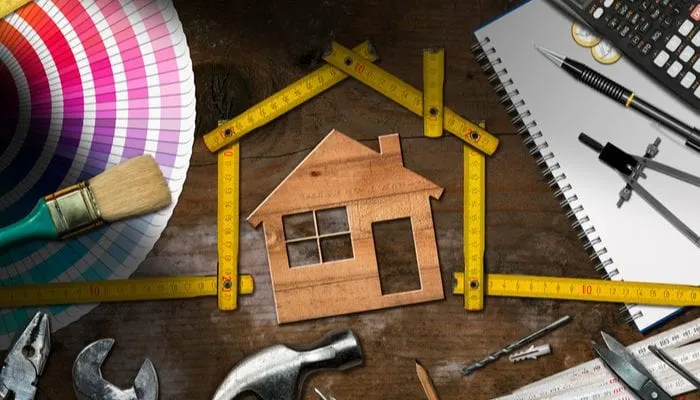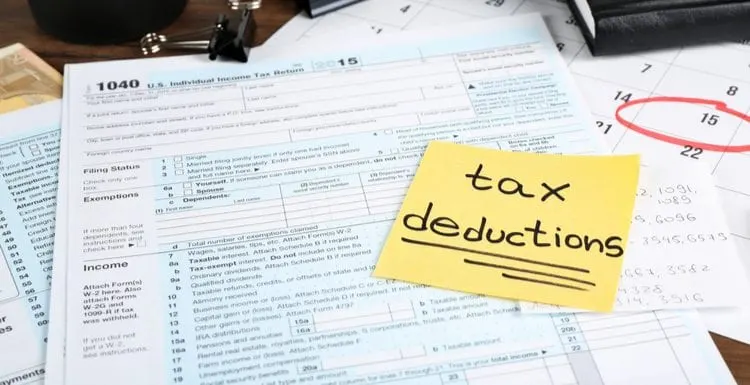It’s a great feeling to finally finish a big home improvement project. Imagine cooling off in a new pool or relaxing in your finished basement.
Know what’s even better? Knowing that you can deduct the cost of the improvement from your taxes. The good news is that you may be able to do just that.
And it could save you some money when you sell the house. However, as with all things tax-related, it’s not so simple. Read on to learn why not.
Are Home Improvements Tax Deductible?

Alberto Masnovo/Shutterstock
First, you can’t, with few exceptions — deduct the cost of improvements until you sell your house. That is, you can’t subtract the $20,000 cost of a major kitchen remodel from your 1040 income figure.
Instead, you have to wait until you sell the house. Then you can subtract from the sale price the cost of the kitchen as well as other improvements you’ve made while you owned the property.
That can significantly reduce your tax bill, depending on your tax bracket and your home’s value. For instance, say you bought your house for $300,000 several years ago. You sell it today for $600,000.
The $300,000 difference between what you paid and what you got for it represents your profit. In tax circles, the profit is known as your gain. That gain is taxable.
Capital Gains Exemption

Vitalii Vodolazskyi/Shutterstock
Fortunately, everyone gets a $250,000 exemption on the gain when selling a primary residence. In this case, just $50,000 of the gain—the $300,000 total gain minus the $250,000 exemption—is taxable income.
Still, in your 25 percent bracket, the taxes on the $50,000 gain come to $12,500. This is where your kitchen remodel comes in. You can deduct the $20,000 you paid to spruce up the kitchen.
That leaves you with a $30,000 gain and a $7,500 tax bill. You saved $5,000 by deducting the cost of your capital improvement. This is not a typical situation.
A $300,000 gain on the sale of a home is more than most home sellers will realize. And married couples get twice the exemption—$500,000—on the gain from the sale of their primary home that single home sellers do.
For most homeowners, the exemption provides enough relief that they don’t need to subtract capital improvement expenses to reduce their tax burden. But if you’re one that would be affected, this is a tax angle you may want to consider.
Know Your Cost Basis

Michael R Ross/Shutterstock
The cost basis or tax basis of your home is a key item of information. This is simply everything it costs you to buy the home, plus any capital improvements.
For the above example, the cost basis is $320,000. That’s the $300,000 initial cost plus the cost of the kitchen remodel.
In this example, a cost basis of $320,000 is subtracted from the $600,000 received when the home sold to get a $280,000 gain. Then the $250,000 exemption is subtracted.
That yields the final taxable gain of $30,000. Note that in addition to the original purchase price and any capital improvements, the tax basis also includes any other costs associated with buying the home.
That includes closing costs, attorney’s fees, and other costs of the transaction.
Allowable Capital Improvements
A kitchen update is a good example of a capital improvement that will create potential tax savings. However, not every project you might invest in to make your house better is an allowable capital improvement.
The Internal Revenue Service says that, generally, additions and improvements are likely to be acceptable capital expenses. Repairs do not count unless they fall under specific circumstances.
This happens when they are part of larger projects that are allowable improvements. For instance, you can’t deduct the cost of fixing a single broken window.
That’s a repair that’s not allowable. But if the window is fixed as part of a project to replace all the windows, it is permissible. The IRS has a list in its Publication 523 of allowable improvements.
It includes:
There are some further restrictions. For instance, the improvement must still be there when you sell the house for the cost to be deductible. And generally, improvements have to have a life of more than one year.
Repair Exceptions

Artur Szczybylo/Shutterstock
Sometimes repair expenses are deductible. For instance, if you are self-employed and have a home office that you claim as a deductible depreciation expense, you can deduct the cost of repairs the year you make them.
This is an exception to the rule of thumb that you can only deduct the costs of home improvements when you sell. You can also deduct things that would be considered repairs when done as part of a larger project.
This is how the broken window repair can be allowed when it’s part of replacing all the windows. Another vital exception concerns repairs done after a fire or natural disaster damages the home.
In this case, all repairs needed to bring the property back to its former condition are deductible capital improvements and change the cost basis used when figuring taxes on the sale of the home.
Save Those Receipts

Andrey_Popov/Shutterstock
Since it may be several years between the time you pay for an improvement to the time you sell the home and need to document the costs of the improvement, recordkeeping is important.
Be sure to keep receipts for any allowable capital improvement. Even if you don’t anticipate having to pay any taxes when you sell, things could change.
For instance, if home prices appreciate more than expected, or divorce or death of a spouse changes the available exemption, an envelope full of receipts could be a serious money saver.
Are Home Improvements Tax Deductible?
Home improvement deductibility is more complex than simply taking the price of your kitchen remodel off this year’s taxes. Only certain improvements are allowed to be deducted.
And except in specific circumstances with a home office, it is not likely the costs will be deductible the year they are incurred.
However, home improvements are deductible, with notable exceptions. To be sure, consult with a knowledgeable tax professional. It’s worth the effort.
Knowing which types of improvements can be deducted, plus having the documents to verify the outlays, can save on taxes and make a beautiful new home improvement that much more enjoyable.

